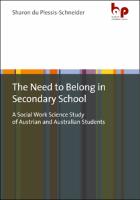The Need to Belong in Secondary School
A Social Work Science Study of Austrian and Australian Students
Author(s)
du Plessis-Schneider, Sharon
Language
EnglishAbstract
Our social interactions are driven by complex biopsychic processes that are complicated by the fact that humans are individuals and at the same time members of one or more social systems, such as schools. This book contributes to explaining the social mechanisms influencing students' “need to belong” fulfilment at school. The theoretical framework is informed by human needs understood as cognitive mechanisms of neural processes that regulate human behaviour and bio-values. The fieldwork was conducted in two secondary schools in Austria and Australia. Based on the findings, the transformative three-step approach suggests a course of action for student belonging. Unsere sozialen Interaktionen werden von komplexen biopsychischen Prozessen angetrieben, die dadurch verkompliziert werden, dass der Mensch ein Individuum ist und gleichzeitig Mitglied eines oder mehrerer sozialer Systeme, wie bspw. der Schule. Dieses Buch trägt dazu bei, die sozialen Mechanismen des „Bedürfnisses nach Zugehörigkeit“ bei Schüler*innen in Schulkontexten zu erklären. Der theoretische Rahmen basiert auf einem Verständnis von Bedürfnissen als kognitive Mechanismen neuronaler Prozesse, die menschliches Verhalten und Körperwerte regulieren. Die Feldforschung wurde in zwei Sekundarschulen in Österreich und Australien durchgeführt. Handlungsleitlinien, die Schüler*innen dabei helfen sollen, sich zugehörig zu fühlen, werden von den Ergebnissen abgeleitet.


 Download
Download Web Shop
Web Shop